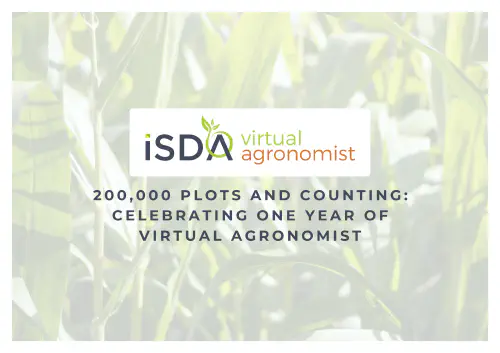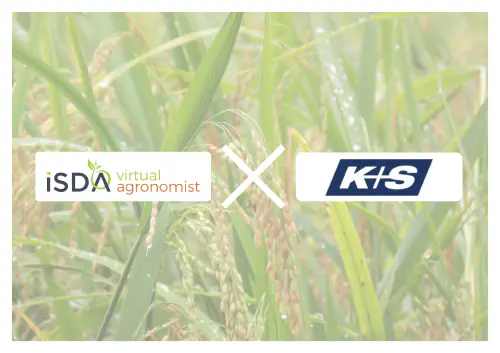From the 7th to the 9th of May 2024, the Africa Fertilizer and Soil Health Summit took place in Nairobi, Kenya. The summit brought together relevant key players in the agricultural industry to establish new policies and investments that will improve soil health and increase yield responses for farmers across Africa.
Bruce Kisitu, our director of operations at iSDA, was engaging and collaborating with government officials and industry stakeholders at AFSHS 2024, to encourage transformative change in the African agricultural sector. He brought awareness to iSDAsoil, our open access soil health data map, and encouraged a continent-wide collaboration on soil data collection.
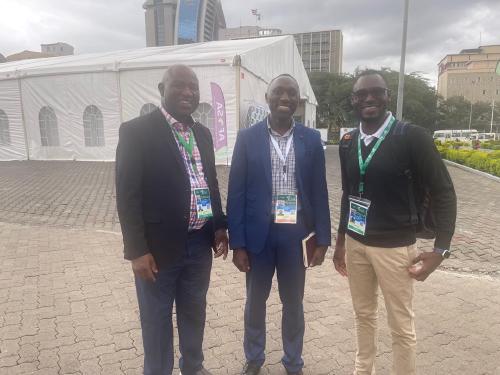
iSDA's Director of Operations, Bruce Kisitu, at the AFSH Summit 2024 with IAPRI researchers Stephen Kabwe and Brian Mulenga.
On the last day of the summit, a declaration was devised by the African Union Heads of State. The Nairobi Declaration 2024 endorses a 10-year plan of action to rebuild soil fertility and increase yield responses and profitability of fertilisers. The declaration demonstrates that member states are aware of the critical issues affecting the productivity of smallholder farmers in Africa and have recognised the urgent need to prioritize soil health and the regeneration of degraded African soils. In response to issues identified during the summit, the declaration announces a commitment that by 2034, at least 70% of smallholder farmers on the continent will benefit from targeted agronomic recommendations for specific crops, soil, and climatic conditions to ensure greater efficiency and a sustainable use of fertilisers. Additional key points set out in the declaration include:
- The emphasis on targeted agronomic recommendations for specific crops, soils, and climatic conditions. This will ensure greater efficiency and improved sustainable fertiliser use compared to the pre-existing blanket recommendations commonly used among smallholder farmers
- Promoting a digital information system to operationalise fertilizer, crop, and climate decision support tools for soil management at national, regional, and continental levels. This would then present an opportunity for innovative ways of collecting, sharing, and using soil information across different actors in the industry
- The crucial recognition that last-mile delivery systems are generally weak and require innovative approaches to reach the targeted 70% of smallholder farmers
- Acknowledging that the management of soil health requires multi-stakeholder collaboration and information sharing is significant. Stakeholders must appreciate the importance of sharing soil data to improve the accuracy of digital maps, which in turn enhances the accuracy of the advisory services delivered to smallholder farmers.
- The adoption of a continental soil health management framework to guide stakeholders which can help manage the widespread duplication and inefficiency of efforts in Africa
Unlike the Abuja Declaration in 2006, which emphasized increasing fertilizer access and use, the 2024 Nairobi Declaration proposes diverse approaches to improving soil nutrient depletion and yield. Even though hopes are high for this new declaration, our director of operations, Bruce Kisitu, who attended the summit in Nairobi, believes that substantial commitments from member states and partners are crucial to achieve the 2034 goals. Implementing public sector commitments in most African countries takes significant time, and financing the commitments of such declarations continues to be a challenge across the continent.
Despite potential challenges facing the declaration, there is hope for many that it will trigger positive changes in the African agricultural industry. We believe that our work at iSDA could help to achieve the declaration’s vital goals. As a provider of digital agronomic advisory services to smallholder farmers, our interventions are closely aligned with the African Fertiliser and Soil Health Summit declaration in two key ways.
Firstly, we have developed iSDAsoil, a continental digital soil map at a 30-metre resolution, which aligns with the Nairobi declaration on establishing a digital information system. Our map provides free access to soil data through the iSDA website, via an API, and through Google Earth Engine and Amazon’s Registry of Open Data. We believe that national Soil Information Systems (SIS) should build upon the work that has already been done, for example, by using our soil map, rather than reinvent new approaches for soil mapping. At iSDA, we have demonstrated that by combining soil data from different countries, more accurate maps can be created. Sharing data is the single most important way we can support each other, as it is the limiting factor for robust soil information systems. We have already developed robust soil mapping pipelines, so new SIS initiatives should focus on the collection of additional samples. Our research has shown that this is the best way to improve the accuracy of maps, especially in under-sampled countries.
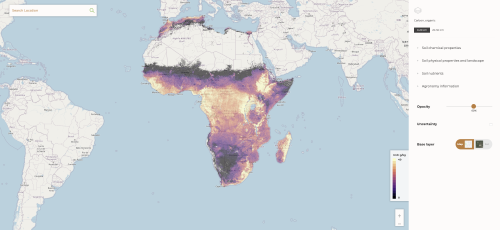
Our iSDAsoil field-level soil map which offers open access soil data to everyone
Secondly, we offer Virtual Agronomist, an innovative AI-enabled solution that leverages the iSDAsoil map to provide tailored advice to farmers. This service includes farm-specific nutrient management advice, pest and disease checks, and detailed soil information. Virtual Agronomist caters to the needs of all smallholder farmers and is aligned to the declaration’s emphasis on targeted agronomic recommendations. Accessible through a user-friendly WhatsApp chatbot, this interactive platform serves both lead farmers and individual farmers in Africa. Virtual Agronomist facilitates direct communication and collaborative efforts, cost-effectively distributing national soil information directly to farmers. By addressing the challenges of long distances faced by public extension workers, it ensures that timely and accurate advisory services are delivered to farmers whenever they need them.
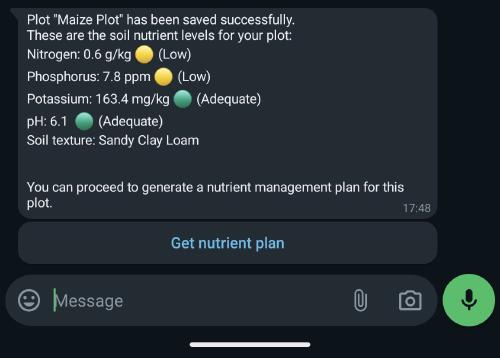
Virtual Agronomist showing a farmer's soil properties before generating a nutrient plan
At iSDA, we know the importance of soil health data and its impact on farmers, their community, and the wider environment. Our vision is that every farmer in Africa can have affordable, expert advice tailored to their farm, thereby improving their yields and livelihoods. Improving access to continental soil information is the foundation of this vision. We are hopeful for the changes set out in the 2024 Nairobi Declaration and are proud to have been a part of the African Fertiliser and Soil Health Summit’s platform for agricultural change and growth.
Find out more about the African Fertiliser and Soil Health Summit here
Read the 2024 Nairobi Declaration here
Find out more information on iSDAsoil here
View the raw data on Amazon Web Services and Google Earth Engine

